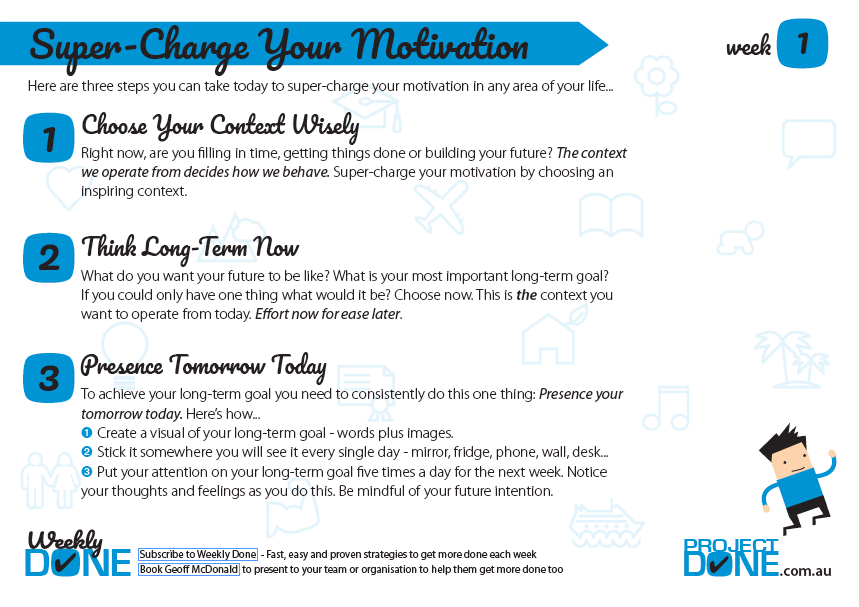
Motivation for Productivity
Do you need motivation for productivity? In their brilliant book, Switch, Chip and Dan Heath suggest the most important thing for being productive is to boost your motivation.
(I rapped this book over at Book Rapper as Sticky Change)
Think back to the last time you were trying to complete an important project. It’s likely you were motivated at the start of the project, and then at some point along the way, you experienced a dip in your enthusiasm, motivation and energy levels. You might have fought your way through the dip and completed your project or you might have pulled the plug, quit and given up.
These are the critical moments when we need to be able to switch on our motivation, to spark the energy we need to keep going until we reach our goal.
In this article, we share three steps to build motivation for productivity so you can get more done when it matters most.

Step 1: The Get More Done Context
You’ve probably heard the old story about the three men working together as part of a team on a construction site. The first was stacking bricks, the second was building a wall and the third was building a cathedral – a home to the gods!
Which one do you think was more inspired?
Likewise, have you heard the old story about President Kennedy visiting NASA in the mid-60? Apparently, he turned to a janitor and asked him what he was working on. The man replied, ‘I’m sending a man to the moon.’ Clearly, this is much more inspiring than ‘mopping a floor’ or even ‘I work for NASA’.
This is the Get More Done context – it’s the way we frame our situation and our goals so we are more motivated, inspired and energized to take the action we need to in the critical moments.
What context are you working from right now? Are you reading this blog to:
- Fill in time and avoid doing what you know you ought to?
- Learning how to be more motivated and more productive?
- One step closer to the amazing future you have planned for yourself and your family?
The context we choose to operate from makes an enormous difference. It can change our levels of motivation; the heights of our inspiration and our ability to get things done.
(Creating and choosing your context is a powerful module in our Project Done program)
TWEET: Three steps to boost motivation for productivity gains #motivate #getmoredone
Step 2: Your Motivation Focus
So what’s the best motivation focus to have?
While this will vary depending upon what your specific goals are, research shows that one subtle shift might make all the difference.
Which do you think is better to focus on:
- Your past?
- The present?
- Your long-term future?
Yep, you guessed it – your long-term future is our most powerful context if you want to motivate yourself here and now.
If you focus on your past you can get stuck in your glory days. Or worse, spend time feeling guilty or regretting past mistakes and lost opportunities. That’s not good for your morale, motivation or productivity.
If you focus on the present, you might stay calm, you might make smart decisions and this is not necessarily a powerful place to inspire yourself to get more done. (More on being in the present in Step 3 below)
The Two Thing to Notice
If you focus on your future, you’re likely to notice two things:
- This is where I currently am, and
- This is where I want to be.
In other words, you’ll notice a gap. This is the key because your motivation for productivity is ultimately a desire or a reason to take action. Being productive only makes sense when we are in action and striving toward a goal – something we want but don’t currently have.
Like a fisherman, we want to cast our line of focus out into the future toward something that we desire.
Ideally, this should be a long-term goal, not a short-term one. When we focus too short, we also look for shortcuts and immediate gratification.
In contrast, a long-term focus more likely points us to put in the hard yards of persistence, building habits and developing grit. It promotes an acceptance that I need to stay motivated and work hard over time. We want to put in the effort now for some ease later in life.
Take a moment now and take some notes about your long-term future.
- What do you want your future to be like?
- What is your most important long-term goal?
- If you could only have one thing what would it be? Choose now.
This is the context you want to operate in today. (For more on Creating Context, I wrote a whole chapter about this in my book Done)
Step 3: Be Inspired to be More Productive
In our third step to being motivated and inspired to be more productive, we want to turn our attention to the present.
We want to be present with our long-term goal so we can choose carefully about what actions we need to get done today. What are we going to be more productive about? How can we build motivation for productivity?
To do this we want to: Presence our tomorrow today – often.
Here are some simple suggestions as to how to do this:
- Create a visual of your long-term goal – words plus images.
- Stick it somewhere you will see it every single day – mirror, fridge, phone, wall, desk…
- Put your attention on your long-term goal five times a day for the next week. Notice your thoughts and feelings as you do this. Be mindful of your future intention. Be present to your long-term future.
Summary: Motivation for Productivity
To build motivation for productivity gains:
- Choose the context that inspires you
- Ideally, focus on your long-term goals
- Be present to this consistently throughout your day



